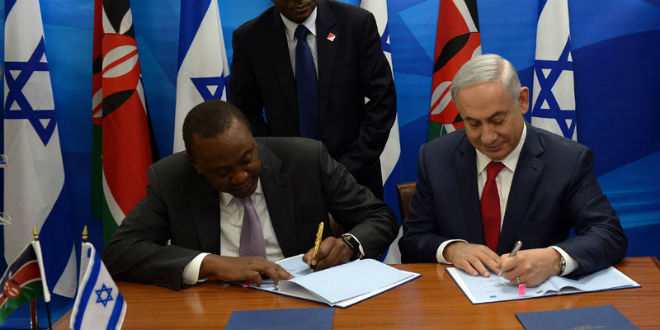In a move signaling the strengthening of ties between the two countries, Kenyan president Uhuru Kenyatta arrived in Israel for the first presidential visit from Kenya in 22 years, meeting with Prime Minister Benjamin Netanyahu and President Reuven Rivlin in Jerusalem on Tuesday.
Kenya and Israel have enjoyed diplomatic relations for over 50 years, collaborating on military and security operations, technological and humanitarian assistance, and trade.
In remarks made to Netanyahu during their meeting, Kenyatta said that Kenya and Israel have a historically “strong partnership” and that the two countries have faced similar challenges.
“With the spirit of us working together, we are both countries have had to struggle for our independence, we have fought for our independence and as such we value the issues of sovereignty, of independence and for the right to self-determination,” he said.

He stated that Israel and Kenya are both “founded on strong principles of democracy, strong principles of freedom of expression, principles of freedom of religious expression and I think this brings us together in many ways.”
The Kenyan statesman also made mention of the security issues faced by both countries. “We both live in challenging neighborhoods with similar security concerns and the cooperation between our two governments since the time of our independence has been formidable and we look forward that this particular trip will strengthen those ties even further.”
Indeed, Kenya has suffered from numerous terror attacks carried out by the al-Qaeda affiliated terrorist group, called al-Shabaab, active in East Africa. Esipisu said in his statement that Kenya hopes to benefit from Israel’s “long expertise” in fighting terrorism.
The two countries will also cooperate in the areas of water resources, fisheries, education, technology, and scientific collaboration, as Israel is known throughout the world for its incredibly innovative solutions to problems managing natural resources. Many countries in Africa have already benefited from Israeli technology in water conservation and agriculture, allowing Israel to shine its light unto the nations.
Kenyatta mentioned the benefits of learning from Israel, saying he looked forward to “deepening our cooperation in agriculture in irrigation, in water management and the experiences that Israel itself has had as well as information technology where we in Kenya can learn a lot from your own particular experiences.”
At their meeting, Kenyatta and Netanyahu signed a joint statement on water establishing cooperation between the countries and a joint bilateral committee.
Kenyatta, the son of Kenya’s first president, Jomo Kenyatta, has a personal connection to Israel through his father. At their meeting, Netanyahu mentioned the actions of Jomo Kenyatta in 1976, when he assisted the IDF in a harrowing rescue mission by giving Israeli pilots permission to refuel their jets in Nairobi during Operation Entebbe in neighboring Uganda. The IDF rescued 102 Israeli and French hostages from Palestinian terrorist hijackers during the operation. Commander Yonatan Netanyahu – the brother of Benjamin Netanyahu – was killed.
On the docket for discussion between the two leaders is Netanyahu’s planned summer visit to Kenya and Uganda in order to commemorate 40 years since the Entebbe operation.
Israeli officials are also expected to raise the issue of Israel’s status in relation to the UN’s African Union (AU) with the Kenyan president. Until 2002, Israel had observer status to the AU’s preceding body, the Organization of African Unity, but under pressure from Muammar Gaddafi, Israel’s status was taken away. In 2013, however, the AU granted “Palestine” observer status while continuing to exclude Israel. Israel hopes to enlist Kenya’s help in regaining its status.
In addition to its political and diplomatic alliance with Israel, Kenya enjoys other kinds of ties with the Jewish State as well, being home to a population of Christian Zionists which works to strengthen the Kenya-Israel relationship on the basis of the Biblical imperative to bless God’s chosen nation.
Kenya Friends of Israel (KFOI), an organization launched in 2012 with Gil Haskel,
then the Israeli Ambassador to Kenya, uses Biblical teachings to explain why strengthening the relationship between Kenya and Israel is so important. “God has called Israel as a people and a nation with an eternal calling which is irrevocable. That calling is still standing today,” KFOI’s website reads, citing Genesis 12:1-3 as the basis of their belief.
The website also touches on Exodus 19:5, which relates that Israel is a priestly nation, meaning that it is meant to teach other nations how to worship and relate to God. In addition, not only is Israel a beacon to other nations in morality and spirituality, but the modern state represents the coming of the Messianic age, when Israel is back in the land and Jerusalem is under the rule of the Jews.
KFOI also works with the Kenya House of Prayer, a Christian organization whose name is derived from Isaiah 56:7, to accomplish its mission of bringing together Kenya and Israel under the banner of Christian Zionism. Joint programs between the organizations include weekly prayers for Israel, discussion of Israel-Kenya diplomatic relations, and educating Christians on the importance of supporting Israel financially and materially.
The post As Kenyan President Visits Israel, Biblical Zionism in Africa on the Rise appeared first on Breaking Israel News | Israel Latest News, Israel Prophecy News.
Source: Israel in the News


